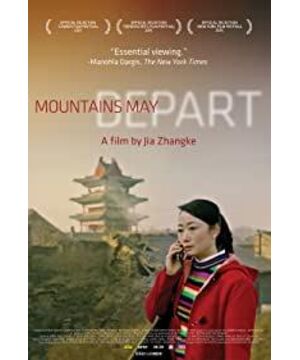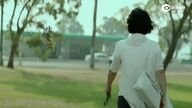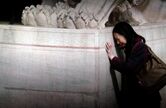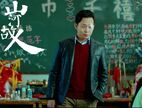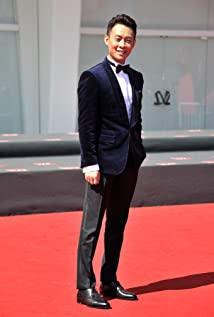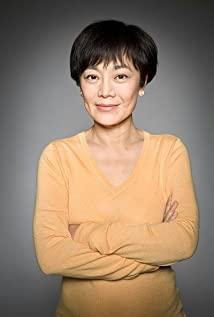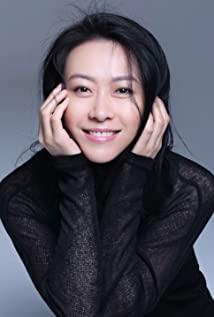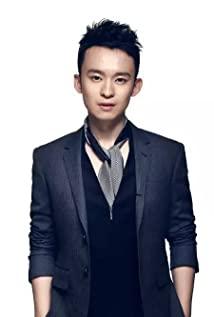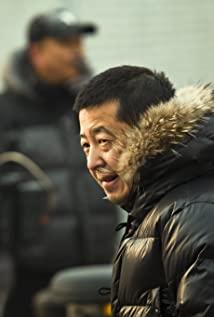in poetry In sexual expression, what is more characteristic is that Jia Zhangke likes to photograph everyday miracles, such as walking a tightrope in the Three Gorges Good People, launching a memorial tower, such as a cart full of tomatoes in Tianding that overturned on the ground, Wang Baoqiang’s fireworks in the New Year’s Eve. Shooting a gun in the sky is like shooting a gun for my son. There are also Glacier Fireworks, Knife-Carrying Boys, etc. These scenes are very complete in themselves. They are not put in the movie, they are taken as photos or videos, or they are written directly into poems, all of which are equally awesome. The poetry of these scenes does not affect the filmmaking. The key problem is that Jia Zhangke has become alienated from daily life, and his understanding of people is actually weaker than before, and there are problems in storytelling.
Let's start with "The Good Man in Three Gorges". Jia Zhangke is no longer satisfied (or unable) to tell a complete story. The collage is addictive. By the time of "The Old Man of the Mountains and Rivers", the collage has reached the extreme. There is one story, but there are clearly three stories... In Jia Zhangke's article on "Xiao Wu", he said that he hoped the film could have a kind of documentary quality, hoping to record the imprint of the times. It may be that the ambition of the metaphor is too big, but the metaphor is afraid that the metaphor is not obvious enough. In the later "Mountains and Rivers" and "The Destiny of Heaven", this documentary nature obviously affects the story and becomes the reproduction of news events. Symbolized, lost soul. In other words, when a character is not only himself, but also represents a certain type of person or phenomenon, the character loses its vitality. In the old people of mountains and rivers, the behavior of the characters is often unreasonable, and the way of behavior is also puzzling. For example: Why did Dale drop out of school, is it just rebellion? The life of father and son is quarrel and Google translation? There is no reason for Dale's love, and it can only be made up by the audience's own brains. It may be because I have not been with my mother since I was a child, and I am a little Oedipus. The details of life that should have been in the plot were gone. Songs, samples, radio, and TV that were commonly used in the past and can increase the quality of life, what about the rich imprint of popular culture? Probably because everyone is so good at playing, it is difficult for the busy Director Jia to grasp, so he simply flips through today's headlines in his spare time, understands people's sentiments, and regards news as his life. Remake news and insert news became the last choice. In "Old Man in Mountains and Rivers", the two most vivid songs "Respect" and "Go West" actually come from the past. Jia Dao's grasp of the current mass culture is no longer as accurate as in the past, maybe it has something to do with age. Hou Hsiao-hsien is actually the same, the modern drama is completely wrong. Paying attention to the times, I think Jia Zhangke can learn from Liu Xiaodong. His paintings also involve many issues of the times, but when you look at it, you are first moved by the state of everyday people - no matter what kind of environment, people The beauty and authenticity of its own are the most moving viewers.
Jia Zhangke's regression is very obvious in "Old Man in Mountains and Rivers", a simple example, two men and women decided not to be together, how to shoot? In "Platform", Cui Mingliang was going to go out to a cave, and Yin Ruijuan told him that he couldn't go to see him. The next two shots: one is Yin Ruijuan wearing a down jacket standing at the door, the other is Cui Mingliang sitting in the back of the truck looking lost. In "Old Man in Mountains and Rivers", Tao ran to send an invitation to Liang Zi foolishly, and the two said goodbye and shed a few tears. Such a simple treatment is still too casual for Jia Zhangke. The emotions in "Platform" are complex and subtle, and the filming method of "The Old Man of Mountains and Rivers" is also the level of micro-films or column dramas. We can't speculate that the decline of the section chief's skill is the result of fame and fortune. But the truth is that he really doesn't understand people so well, and everyone's character is no longer so distinctive and lovely. There has never been a movie that made you feel that he was related to you after watching it, said what you were holding in your heart, and moved or sighed: it turns out that someone can really express such complexity in such a simple way. And accurate feelings. Now, does he understand Xiao Wu who went directly to the second floor in order to compare his height? Does he still understand Zhang Jun who cut his long hair with scissors by the Yellow River? When did Jia Zhangke use clichés such as terminal illness and suicide in the script, and even the love triangle was so unsurprisingly unsurprising—the way any third-rate director would choose to shoot, a poor boy, a local tyrant and a woman, is no longer there. What a suspense. The relationship between the characters is similar. The part of Jiang Wu going to his first love in "Destined" is not bad. Facing her who already has a family and children, she will definitely not get the comfort she wants. And Tao gave Liang Zi a gift, in addition to an invitation, there is a stack of money. (Oh, by the way, Liang Zi's wife is too playful, like she just came out of a bitter TV series)
Watching Director Jia's recent films, I obviously feel that Jia Zhangke is slowly different from the past. I still enjoyed the process of watching, and some small details are still the same as Jia Zhangke, but after watching it, I can't say good or bad. There is nothing to say. I suspect that it is because I like those films about Shanxi too much, so I am not used to his attempts in new fields. After watching "The Old Man of Mountains and Rivers", I found out that these films as a whole have no more. That kind of direct-to-the-heart power. Jia Zhangke became straightforward, began to have a greater vision and ambition, and began to rush to speak clearly, as if he was afraid that others would not understand, and he seemed to inevitably contract the disease of the times. (In stark contrast to his bigger ambitions, he still had to use Fenyang as the origin of the story, and he had to make Zhao Tao the heroine) "Old Man of Mountains and Rivers" is nothing more than trying to say "everyone can only accompany me." You walk a long way." If you can't go back to your hometown, it's hard to find an old friend again. There is nothing wrong with this, the problem is the way of expression and the level of expression.
In my personal opinion, in fact, "The Old Man of the Mountains and Rivers" and Jia Zhangke's previous films are all works that are great in part but not very good as a whole. Taking those parts out separately and changing the form can make it more interesting. Jia Zhangke has shot a lot of documentary images, some of which are used in Shanhe Old Man. I think this way of shooting is great, and "Public Space" is very good. Documentary images that do not carry a narrative function are actually difficult to exist alone in a movie. , but when you jump out of the movie, the world is actually bigger. These clips are very good as videos. I will do a few LeTV TV shows and show them in art museums. Or you can write some poems, some prose, and engage in contemporary art. These are all things that Jia Zhangke is capable of and can do very well. There's no need to die for movies.
View more about Mountains May Depart reviews


